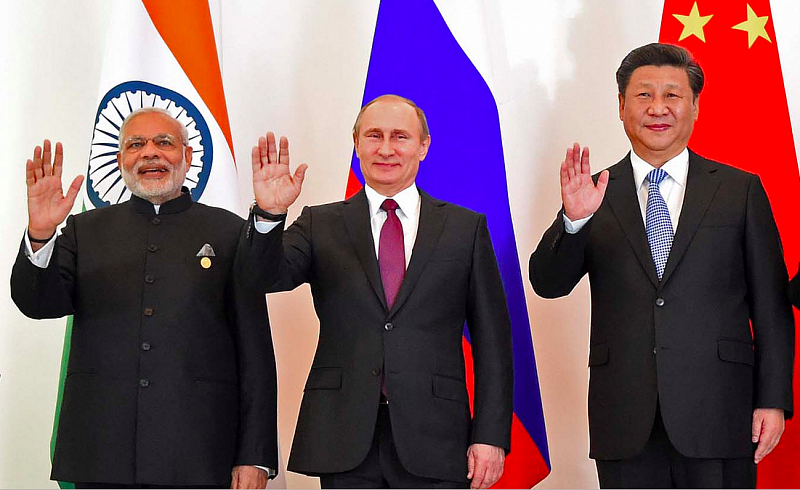The Russian-Indian 2+2 Format Will Synchronize Their Grand Strategies
In
Log in if you are already registered
The recent announcement by Indian Prime Minister Modi that he and Russian President Vladimir Putin agreed to establish the 2+2 format of talks between their Defense and Foreign Ministers will synchronize the grand strategies of the two great powers. There have been noticeable concerns from both sides over the past few years that these special and privileged strategic partners have gradually been drifting away from one another as Russians fretted about India’s growing ties with the US while many in the South Asian state voiced concerns about Moscow’s expanding ties with Beijing.

Source: South African foreign ministry
This emerging geostrategic dynamic of India moving closer to the US in parallel with Russia’s moves towards China is occurring against the backdrop of what many have described as the ongoing New Cold War between the de facto superpowers. Many feared that the end result will be that Russia and India find themselves on the opposite sides of the New Cold War. That outcome would be disastrous for stability both in Eurasia and in the Indo-Pacific, since it would be a totally unprecedented development, seeing as how Russian-Indian relations have hitherto enabled a semblance of predictability and, therefore, stability between these two strategic spaces.
It is for this reason why the establishment of 2+2 talks between Russia and India should be welcomed. Prime Minister Modi’s announcement attests to his government’s willingness to adjust its multi-alignment strategy that had recently been perceived by many observers and especially those in Moscow of having over the past few years been tilted in Washington’s favor and at Beijing’s expense. I elaborated on the need for India to reconsider the direction of its grand strategy in a recent analysis that was published by TheWire about how “India’s Multi-Alignment Strategy Requires Recalibration And Clarification”.
That piece followed a related one that I released last month at ThePrint about how “Russia Isn’t Hyphenating India-Pakistan But Balancing Both For Its Win-Win Plan”. I wrote it in response to that publication’s prior report that some unnamed Indian officials were very concerned about Russian Foreign Minister Sergei Lavrov’s trip to Pakistan immediately after visiting India. I explained in a different analysis at the time for Pakistan’s Express Tribune “How Russia Restored Balance To its South Asian Strategy” after that trip, drawing attention to Russia’s support for Pakistan’s new multipolar grand strategy that I previously elaborated on as well for that outlet.
It compellingly appears in hindsight that the rapid rapprochement between Russia and Pakistan might have been responsible for inspiring India to reconsider the direction of its multi-alignment strategy. The academic article that I co-authored last year about “Pakistan’s Role In Russia’s Greater Eurasian Partnership” and which was republished by the Russian International Affairs Council (RIAC) comprehensively explains their complementary strategic interests. It should be reviewed by readers who might not be familiar with the driving forces behind their rapprochement in recent years.
Indians’ prevailing misperceptions about Russia’s strategic motives in improving its relations with both China and Pakistan over the past few years were partially responsible for the distrust that began to plague its relations with India, just as were Russians’ misperceptions about India’s strategic motives in improving its relations with the US-led Quad. Regrettably, neither great power made much of an effort to convincingly articulate the reasons behind their respective strategic recalibrations, which were mostly due to the dynamics of the New US-Chinese Cold War and had little to do with Russian-Indian relations. As a result, mistrust increased over the years.
Thankfully, Lavrov’s recent trip to the region seems to have successfully repaired the damage that these misperceptions inadvertently dealt to bilateral relations. Russia and India presumably had very frank discussions about these issues, which belatedly led to them realizing that there was never any real reason for such mistrust in the first place. This positive outcome likely influenced Prime Minister Modi’s decision to establish 2+2 talks between India and Russia in order to synchronize their grand strategies and make up for the time that was lost over the past few years as a result of their respective misperceptions.
The most mutually beneficial direction that both great powers should work towards is their joint leadership of a New Non-Aligned Movement (Neo-NAM) for perfecting their complementary balancing acts in the context of the many geostrategic complexities connected with the emerging multipolar world order. I wrote about this ambitious proposal in detail last year in another academic article that I co-authored, “The Prospects Of Russia And India Jointly Leading A New Non-Aligned Movement”, this time for the official journal of MGIMO University.
As with my earlier cited academic article about Russian-Pakistani relations, this one should also be reviewed by readers if they're not already familiar with the concepts that I put forth in that piece. The strategic insight is more relevant than ever due to the establishment of 2+2 talks between these Great Powers. Seeing as how Russia and India are finally overcoming their mutual misperceptions and associated mistrust of the other, they now have the exciting opportunity to make a major move in the New Cold War that could greatly contribute to global stability if they successfully synchronize their grand strategies through this format.
American Moscow-based political analyst specializing in the relationship between the US strategy in Afro-Eurasia, China's One Belt One Road global vision of New Silk Road connectivity, and Hybrid Warfare
Blog: Andrew Korybko's blog
Rating: 1




